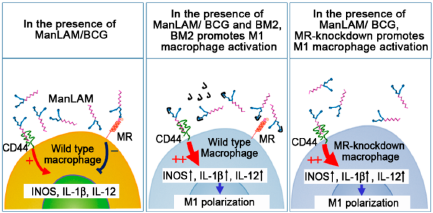New progress about tuberculosis vaccineadjuvant from Professor Xiao-Lian Zhang’s lab published on theworld-renowned academic journal "Journal of the American Chemical Society(JACS)"
On August 29th, the Journal of the American Chemical Society (JACS) (Impact Factor: 13.038) published online the research results in the field of tuberculosis vaccine from Professor Xiao-Lian Zhang research group from State Key Laboratory of Virology, Medical Research Institute and School of Basic Medical Sciences, Wuhan University. The paper titled “A single ssDNA aptamer binding to Mannose-capped lipoarabinomannan of Bacillus Calmette-Guérin enhances immunoprotective effect against Tuberculosis”. Prof. Zhang is the corresponding author of the paper, and Dr. Xiaoming Sun and Dr. Qin Pan are the co-first authors.
Tuberculosis (TB) is the leading cause of death by infectious disease in the world. One-third of the world’s population is infected withMycobacterium tuberculosis (M.tb). An attenuated strain vaccine ofMycobacterium bovis, termed Bacillus Calmette–Guérin (BCG), the only available used TB vaccine has been used globally for protection against childhood and disseminated TB. However, its efficacy at protecting against pulmonary TB in adult and aging populations is highly variable. Zhang’s research group for the first time developed a novel immune enhancer of small nucleic acid molecule “aptamer” which can significantly improve the BCG immunogenicity. Furthermore, the aptamer enhanced immune-protective effects of BCG against virulentM. Tb infection in mice and rhesus monkeys models.
In this paper, single-stranded DNA (ssDNA) aptamers are generated from small-molecule random library pool. The selected ssDNA aptamer (termed BM2) specifically binds to Mannose-capped lipoarabinomannan (ManLAM) from BCG. The BM2 blocks the binding of BCG ManLAM with the inhibitory receptor on macrophages, promotes the binding of ManLAM to the activating receptor, enhances macrophage M1 polarization and Th1, Th17 cells activation, and therefore enhances the resistance of cells to TB infection. The immune enhancer BM2 can significantly enhance immune-protective effects of BCG against virulentM.tb infection in mice and rhesus monkeys models. This study provides a novel approach and strategy for enhancing the immunogenicity of BCG vaccine for TB prevention. (Paper link:http://pubs.acs.org/doi/abs/10.1021/jacs.6b05357).
(Edited by: Pan Qin)



